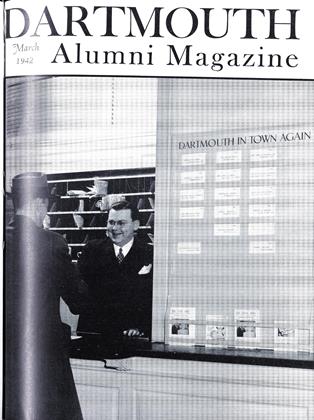DR. ERNEST E. JUST '07, who died last October, was one of Dartmouth's outstanding alumni. A negro, he was undoubtedly one of the most distinguished of his race in the field of biology.
Graduating magna cum laude, he was a member of Phi Beta Kappa, and received special honors in zoology and history. He went immediately into teaching at Howard University, and in 1909 took up graduate study at the Marine Biological Laboratory at Woods Hole, Massachusetts. In 1910 he became assistant professor of biology at Howard University, and later received a full professorship. In 1911-1 a he served as research assistant to Dr. Frank R. Lillie. This experience turned him toward what became his special work in biology.
Professor Just took his Ph. D. degree in 1916 at the University of Chicago, also magna cum laude. Meanwhile, he had completed six papers, based upon his work during the summer months at Woods Hole, so that in 1915, in recognition of the excellence of his work, and his efforts toward the improvement of medical education at Howard and other negro universities, the Spingarn Medal was first awarded to him. This honor is presented annually to "the man or woman of African descent who shall have made the highest achievement during the preceding year or years in any honorable field of human endeavor."
From 1907 to 1941 Just was a member of the Howard University staff, being made head of the department of zoology in 1912, a post he held for 29 years.
In the twenty-five years after 1912 he wrote about fifty papers dealing with his special work, and also made a number of theoretical contributions. In 1939 Dr. Just published two books, the first being "Basic Methods for Experiments in Eggs of Marine Animals," and the second, "The Biology of the Cell Surface."
As a consequence of his extreme skill in the field of biology, Dr. Just was very much in demand, especially among physiologists who needed advice and assistance to supplement their knowledge of physics and chemistry. His technical papers were characterized by an intimate and thorough knowledge of material, and the use of it to the highest advantage.
His scientific career was marked by a constant struggle for an opportunity for research. In Dr. Lillie's words, as published in the weekly journal, "Science" "He was condemned by race to remain attached to a negro institution unfitted by means and tradition to give full opportunity to ambitions such as his An element of tragedy ran through all Just's scientific career due to the limitations imposed by being a Negro in America, to which he could make no lasting psychological adjustment in spite of earnest efforts on his part. The numerous grants for research did not compensate for failure to receive an appointment in one of the large universities or research institutes. He felt this as a social stigma, and hence unjust to a scientist of his recognized standing. In Europe he was received with universal kindness, and made to feel at home in every way; he did not experience social discrimination on account of his race, and this contributed greatly to his happiness there That a man of his ability, scientific devotion, and of such strong personal loyalties as he gave and received, should have been warped in the land of his birth must remain a matter for regret."
 View Full Issue
View Full Issue
More From This Issue
-
 Article
ArticleTrials, Tribulations, Success
March 1942 By RALPH SANBORN '17 -
 Sports
SportsBig Green Teams
March 1942 -
 Class Notes
Class Notes1917*
March 1942 By EUGENE D. TOWLER -
 Class Notes
Class Notes1937*
March 1942 By DONALD C. MCKINLAY -
 Article
ArticleIndians Scout for the Fleet
March 1942 By LT. E. F. PLANK, UNITED STATES NAVAL RESERVE -
 Class Notes
Class Notes1931*
March 1942 By CHARLES S. MCALLISTER








